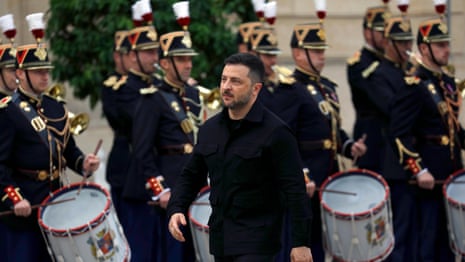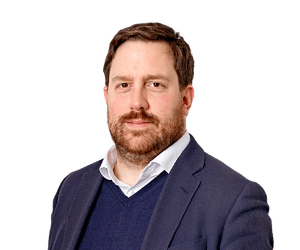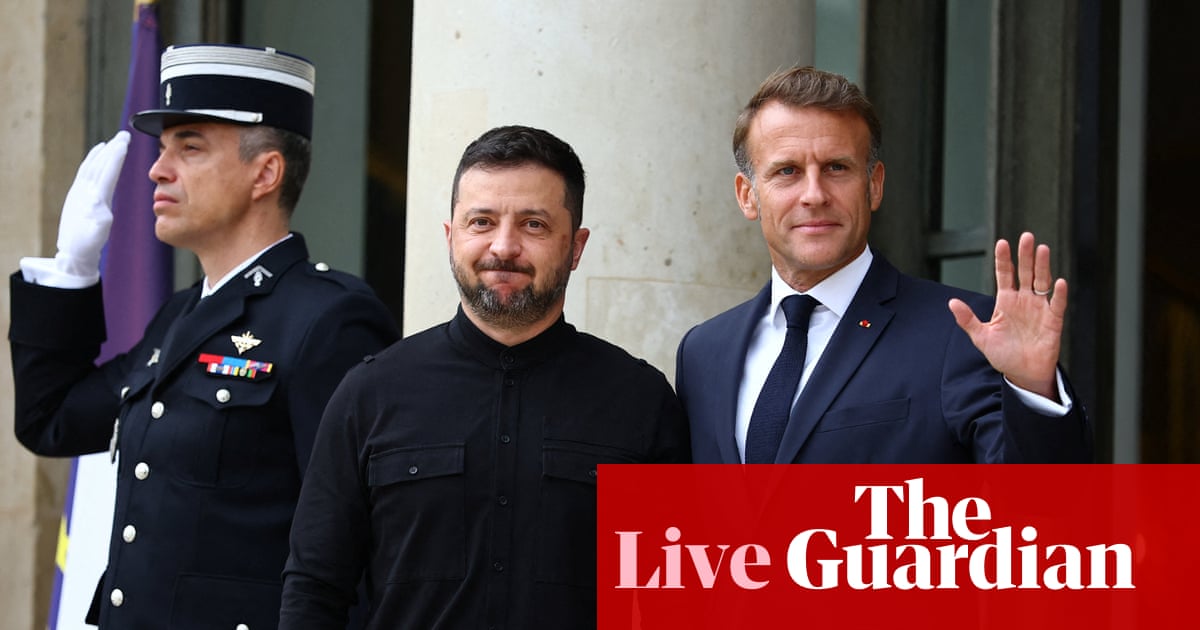Coalition of the Willing meets to ‘finalise robust security guarantees for Ukraine,’ Macron says
Looks like that’s full house, with more leaders joining online, too.
Opening the meeting, Macron says the leaders meet to “finalise robust security guarantees for Ukraine, and all the work that has been done in recent weeks.”
And after his very brief remarks, the media are asked to leave.
The leaders are expected to speak with Trump early afternoon, and will brief the press once all is done.
Key events
23m ago
Coalition of the Willing meets to ‘finalise robust security guarantees for Ukraine,’ Macron says
50m ago
Not for Russia to decide if Ukraine can have foreign troops as security guarantees, Nato’s Rutte says
1h ago
Nato’s Rutte praises Trump’s impact on Nato, says Russia ‘noticed’ alliance ‘stepping up’
1h ago
Spain’s Sánchez to attend coalition meeting online after his plane breaks down
1h ago
Russia, China, Iran preparing for ‘long term confrontation,’ Nato’s Rutte warns
1h ago
Europe needs to produce more, faster to match Russia, Nato’s Rutte says
1h ago
Europe shouldn’t be naive about Russia’s ‘destabilising, confrontational’ force, Nato’s Rutte says
2h ago
Morning opening: Where there is a will, there is a way
Show key events only
Please turn on JavaScript to use this feature
Poland’s Donald Tusk is at the Élysée now too.
Ukraine’s Volodymyr Zelenskyy has just arrived too – in a much bigger car than other leaders (presumably for security reasons?).
And the Danish prime minister, Mette Frederiksen.
It’s funny to watch Macron stand at the top of the stairs trying to figure out who’s coming next, and then reacting to them getting out of the car. If you look carefully, you can make out who are his favourites, I think!
The Dutch prime minister Dick Schoof is next.
Updated at 04.36 EDT
Belgium’s Bart de Wever, Finland’s Alexander Stubb, and the EU’s Ursula von der Leyen and António Costa are the first leaders arriving at the Élysée Palace, welcomed by Macron on the doorstep.
We are turning our eyes to Paris now as leaders are expected to start arriving for the meeting of the Coalition of the Willing shortly.
You can watch along on our stream below, but I will bring you all the key updates here.
 Heads of state arrive for a meeting of the “Coalition of the Willing” – watch live ShareNot for Russia to decide if Ukraine can have foreign troops as security guarantees, Nato’s Rutte says
Heads of state arrive for a meeting of the “Coalition of the Willing” – watch live ShareNot for Russia to decide if Ukraine can have foreign troops as security guarantees, Nato’s Rutte says
Rutte gets also asked about his views on Russia’s opposition to the deployment of any Nato troops to Ukraine as part of security guarantees.
He says:
“But why are we interested in what Russia thinks about troops in Ukraine? It’s a sovereign country. It’s not for them to decide. …
Russia has nothing to do with this. … Ukraine is a sovereign nation. If Ukraine wants to have security guarantee forces in Ukraine to support the peace deal, it’s up to them. Nobody else can decide about it.
I think we really have to stop making Putin too powerful. He is the governor of Texas, not more. So let’s not take it too serious.”
And that ends his Q&A at the IISS Prague event.
ShareNato’s Rutte praises Trump’s impact on Nato, says Russia ‘noticed’ alliance ‘stepping up’
Nato’s Rutte is now talking about Trump and giving him credit for motivating some countries to step up and increase their defence spending.
He says:
“Do you really think if he would not have been elected president united states, that Italy, Canada, Spain, Slovenia, Belgium and Luxembourg would have committed to do 2% this year? Do you really think that the whole of Nato would have committed to 5% committed to 5% including 3.5% core defence spending at the Nato Summit in The Hague?”
He says it was thanks to Trump that Nato is “finally dealing with this enormous pebble in the shoe, this enormous irritant that Europeans and Canada were basically lecturing the Americans, but not spending the money.”
On Russia, he says Trump “broke the deadlock” on Ukraine, insisting that “starting that conversation with Putin was important and crucial.”
He adds:
“He took that leadership role, and it is not easy to solve this, but he is absolutely committed to doing that.
We are now working on these security guarantees necessary to make sure that also Zelenskyy knows that if he starts into conversations with the Russians, hopefully soon, that he has the backup and that he knows that that the security guarantees will in place so that Russia, after a peace deal, will never ever again to try to invade Ukraine, so no repeat of Budapest and no repeat of the Minsk agreement.”
He refuses to speculate on what would make Nato trigger the Article 5, but he insists:
We are stepping up. The Russians noticed. They hate it, and I love it.
ShareSpain’s Sánchez to attend coalition meeting online after his plane breaks down
Meanwhile, we are getting a news line from Madrid saying that the Spanish prime minister, Pedro Sánchez, will join the Coalition of the Willing’s meeting online, after his plane broke down.
El País noted that the official state planes “are very old” and have a history of breaking down, but there is no political consensus on purchasing new aircraft.
ShareRussia, China, Iran preparing for ‘long term confrontation,’ Nato’s Rutte warns
Rutte then goes on to talk about the risk of broader confrontation in the future, referencing the pictures from the Chinese military parade in Beijing yesterday, as he says that Nato’s moves are not about “a new arms race, … but to protect” the alliance.
He says:
“Some may worry about a new arms race, but our own aim, I can tell you, is not to provoke. Our aim is to protect and to ensure that we can continue to enjoy the freedom and security that we all hold so dear, the freedom and security that Nato was founded to preserve.”
He adds:
“Russia’s unprovoked war against Ukraine is the most obvious example of that threat. But the threat will not end when this war does, nor is the challenge limited to Russia. China, Iran and North Korea pose challenges individually and as a result of the cooperation. Only look at the pictures from Beijing the last couple of days and the hand holding.
They are increasing their defence industrial collaboration to unprecedented levels. They are preparing for long term confrontation. And as I said earlier, the challenges we face are lasting. So we must be prepared.”
ShareEurope needs to produce more, faster to match Russia, Nato’s Rutte says
Rutte says that despite adopting more ambitious spending targets earlier this year, “cash alone can’t provide security.”
He goes on:
“We need the capabilities, real firepower, heavy metal, as well as new tech, and that’s what our defence industry across the Alliance needs to deliver faster than ever in Europe and also in the United States. Simply all over the Alliance, we are not producing enough.”
But he says “we are already turning the tide on defence production, and particularly when it comes to ammunition,” paying particular tribute to Czech Republic.
“We are gradually refilling our stocks and narrowing the production gap with Russia,” he says.
ShareEurope shouldn’t be naive about Russia’s ‘destabilising, confrontational’ force, Nato’s Rutte says
Nato’s secretary general Mark Rutte is speaking at the IISS Prague Defence Summit now.
He says he wants to talk about the need to increase European military capabilities to keep the continent safe.
He says Europe needs to respond to “Russia and China investing heavily to build up and modernise their militaries” at “a remarkable, I might say, at a staggering rate.”
He says this equipment is being used against Ukraine, and while the alliance is “working to end this aggression as quickly as possible,” Europe should not be naive about the future.
“This trend is not going to shift or reverse anytime soon. Russia is and for the foreseeable future, will remain, a destabilising and confrontational force in Europe and the world,” he says.
ShareMorning opening: Where there is a will, there is a way Jakub Krupa
Jakub Krupa
The so-called Coalition of the Willing is meeting today in Paris and online for further talks on security guarantees for Ukraine in case of a peace deal with Russia.
Hosted by the French president, Emmanuel Macron, a group of mostly European leaders – including Ukraine’s Volodymyr Zelenskyy – will discuss how to turn their will to help Ukraine into concrete, specific guarantees that would give Ukraine the confidence that any peace arrangement with Russia could hold.
President of the French Republic Emmanuel Macron welcomes Volodymyr Zelenskyy, President of Ukraine, for a working meeting and dinner. Photograph: Jeanne Accorsini/SIPA/Shutterstock
Welcoming Zelenskyy last night, Macron announced that, after months of work by military planners, Europe was finally ready to provide the guarantees and would politically endorse their plan at the meeting today. Let’s see what it entails.
The leaders start arriving around 9am BST, 10am CEST for talks among themselves, before holding a call with US president Donald Trump at 1pm BST/2pm CEST. We will hear what they agreed on an hour later.
For what it’s worth, Trump declared last night that he had been thinking about organising a face-to-face meeting between Zelenskyy and Russia’s Vladimir Putin, but did not commit to any specific action.
“Something is going to happen, but they are not ready yet. But something is going to happen. We are going to get it done,” he told CBS.
Earlier, he told reporters at a meeting with the Polish president, Karol Nawrocki, that Putin would have to make a decision on next steps and “if we are unhappy about it, you will see things happen”.
Whatever that means.
Let’s see what the day brings us. I will bring you all the key updates here.
It’s Thursday, 4 September 2025, it’s Jakub Krupa here, and this is Europe Live.
Good morning.

